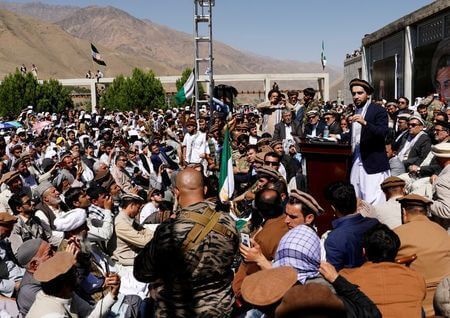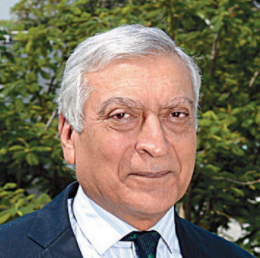
Afghanistan- No Last Word Yet
Thu, 02 Sep 2021 | Reading Time: 6 minutes

Sher Mohammed Abbas Stanikzai, the head of Taliban’s Doha office, has met our ambassador in Doha at his request. This contact was preceded by his interview with an Indian TV channel in which he spoke re-assuringly about wanting friendly ties with India, as well as Tajikistan, Iran, Pakistan, and seeking the involvement of US and NATO in Afghanistan’s rehabilitation. He denied that the Taliban may team up with Pakistan to target India, and while recognising that there is a long political and geographical dispute between India and Pakistan, he distanced himself from it, leaving it to both countries “to fight themselves on the border”, and asserted that Afghanistan will not allow its land to be used for this conflict, implicitly including LeT and JeM in this response to a pointed question.
He assured there was no danger to the lives of Hindus and Sikhs-the message being, for whatever its worth, that the minorities will be safe under the Taliban. He was confident that the “Islamic Emirate of Afghanistan” will form the government. He characterised all the developmental work done by India in Afghanistan as national assets and invited India to complete the unfinished projects in security.
These are the right things to say to address India’s apprehensions about the Taliban take-over of Afghanistan with the backing of Pakistan. Whether Stanikzai speaks for other key leaders and the rank and file of the Taliban is not tested. Equally, whether the Taliban is sufficiently centrally controlled and disciplined and how much it is faction-ridden will be known more clearly only in due course.
The Haqqani group, a particularly noxious one close to Pakistan and reputedly to the Al Qaida, is, according to the US, a separate entity (true or a politically expedient distinction?). With Khalil Haqqani appointed the chief of security in Kabul, the practical value of Stanikzai’s assurances can be debated. And if the IS-K is active, as the ghastly airport attacks show, all the more what Stanikzai says cannot be relied upon for considered policy decisions at this stage, even if his sincerity were not to be questioned.
How Pakistan will see Stanikzai’s interview and the Taliban’s outreach to India is of interest. Clearly, Pakistan will be unhappy that while it has made every effort to exclude India from Afghanistan, Stanikzai is inviting India to re-establish its presence in the country and pursue its projects there. This implies India not only re-opening its embassy in Kabul, but also its consulates, and the provision by the Taliban of needed security.
There is a hint here of not only balancing Pakistan, but also China. Foreign Minister Qureshi thinks that not being a contiguous country, India’s large presence in Afghanistan is not justified. Pakistan’s demonising of our various consulates in Afghanistan is well known. What Pakistan will now do behind the scenes will be interesting to watch. It is too early to reach any definitive conclusions, but the stone Stanikzai has thrown will make some waves, even if what he said was tactically intended to soften Taliban’s image, dilute external concerns, gain time, and gather regional and international acceptance.
The interview could well have been a choreographed exercise to create the political ground for a meeting with the Indian ambassador. Now that the Taliban is in control of Afghanistan it would have made no sense to reject a meeting. For evacuating the remaining Indian nationals and those Afghans who seek to come to India, talking to the Taliban who now control the Kabul Airport cannot be avoided. This is a purely pragmatic, practical requirement and has nothing to do with the larger questions regarding the formal acceptance of Taliban rule and our embassy beginning to function in Kabul again.
There has been some criticism even in professional foreign policy circles that India should not have closed its mission in Kabul, unlike in the case of Russia and China, because now our nationals and those Afghans who wish to seek refuge in India have no point of contact. This view ignores the fact that the Indian mission and nationals have been targets of terrorist attacks in the past, with casualties. With the Haqqanis in charge of security in Kabul and their especially close nexus with the ISI, could the government have taken the risk of keeping our embassy open at a time of all round panic and uncertainty?
The Taliban, with their safe havens in Pakistan, have never been friends of India. If, taking the risk, India had left some personnel in place and there was some loss of life or hostages taken, then a host of arguments would have been made about the foolhardiness of the government, its refusal to see the signs on the wall, needlessly endangering our people and walking into the trap of having to seek release of hostages against some humiliating concessions by our side.
It is being wrongly projected by some commentators in India that the meeting between Stanikzai and our ambassador in Doha constitutes formal diplomatic recognition of the Taliban government by us. Stanikzai is for the moment only the head of Taliban’s Doha office. He does not hold any government position; indeed at the time of writing, the new government in Kabul to replace the Ghani government has not been announced. It is as yet unclear whether it will be an inclusive government, as is expected by the international community, or a purely Taliban government. Who the figures are in the new government and what will be its declared agenda will be important going forward.
UN Security Council Resolution 2593, on which Russia and China abstained, has laid down some important markers, and the extent to which the Taliban meets them will determine the attitude of the western countries to them, in particular. The resolution demands that Afghan territory not be used to threaten or attack any country or to shelter or train terrorists, or to plan or finance terrorist acts. It specifically mentions individuals designated by the UNSC resolution 1267-which, for India, includes the Lashkar-e-Taiba (LeT) and the Jaish-e-Mohammad (JeM). It reiterates the importance of combating terrorism in Afghanistan and notes the Taliban’s relevant commitments. All this reflects India’s specific concerns.
According to the US, the resolution establishes clear expectations, that the Taliban will live up to its commitment to allow Afghans the right to leave the country. France has underscored the importance to fight terrorism within the country with the help of the Taliban and the preservation of the achievements of the last 20 years with the establishment of a transitional government that meets the needs of all people.
The UK believes that the Council had made their expectations of the Taliban clear through the resolution, which is that Afghanistan can never again become a haven for terrorists and the gains of the last 20 years, including on the human rights front, must be safeguarded. Ireland has underlined the importance of including the voice of women in any negotiated agreements, and that the Taliban will be judged by its actions and not by its words.
Russia does not want the freezing of Afghanistan’s economic assets, as does China, besides the latter stressing that it was vital to work with the Taliban and provide them with guidance in order to help maintain stability. Apart from human rights and gender issues, the EU is deeply concerned about migratory flows into Europe from Afghanistan. The situation on this count will influence considerably EU’s attitude to the new government in Kabul.
To what extent Russia and China will be guided by the expectations laid out in the UNSC resolution remains to be seen, as they seem to be more willing than the western countries to do normal business with the Taliban government. Keeping their embassies open amounts to “recognising” the Taliban take-over.
The western countries have concerns about Afghanistan becoming a staging ground for international terrorism again and migratory flows. The EU wants to deal with Pakistan and Turkey to stem Europe-bound flows. Even accepting the Afghans who have worked for them is being seen as a burden. They would prefer a relatively stable Afghanistan even under Taliban rule on condition that the Taliban honour some human rights and gender related commitments. If Afghanistan becomes an Islamic Emirate under the Taliban, to what extent this will prevent the western countries (and India) to recognise it given the statements that have been made ruling it out remains to be seen.
The US has long negotiated with the Taliban, signed the Doha agreement with them, obtained their political and security cooperation for evacuating their forces and Afghan nationals, absolved the Taliban for the airport attack and pointedly held the IS-K responsible, and has de-linked them even from the Haqqani group. All this indicates a readiness to accept the reality of a Taliban controlled Afghanistan.
The freezing of financial assets, the use of the IMF tool are pressure points on the Taliban to meet the expectations laid out in the UNSC resolution. Whether the Taliban can meet all of them is open to question, as that will mean giving up their core ideology in some key areas of religion, traditions and culture. The role of Pakistan in engineering a Taliban victory is being glossed over. Sanctioning Pakistan does not appear to fit into the strategy of stabilising Afghanistan as much as possible under the Taliban.
The last word, however, is far from being said about what happens in Afghanistan next.
***********
Author

Kanwal Sibal is a distinguished career diplomat who retired as Foreign Secretary to the Government of India. In 2017, The Government of India awarded him with the Padma Shri award for his distinguished services in the field of Public Affairs.
Disclaimer
The opinions expressed in this article are the author’s own and do not reflect the views of Chanakya Forum. All information provided in this article including timeliness, completeness, accuracy, suitability or validity of information referenced therein, is the sole responsibility of the author. www.chanakyaforum.com does not assume any responsibility for the same.
Chanakya Forum is now on . Click here to join our channel (@ChanakyaForum) and stay updated with the latest headlines and articles.
Important
We work round the clock to bring you the finest articles and updates from around the world. There is a team that works tirelessly to ensure that you have a seamless reading experience. But all this costs money. Please support us so that we keep doing what we do best. Happy Reading
Support Us




















POST COMMENTS (0)